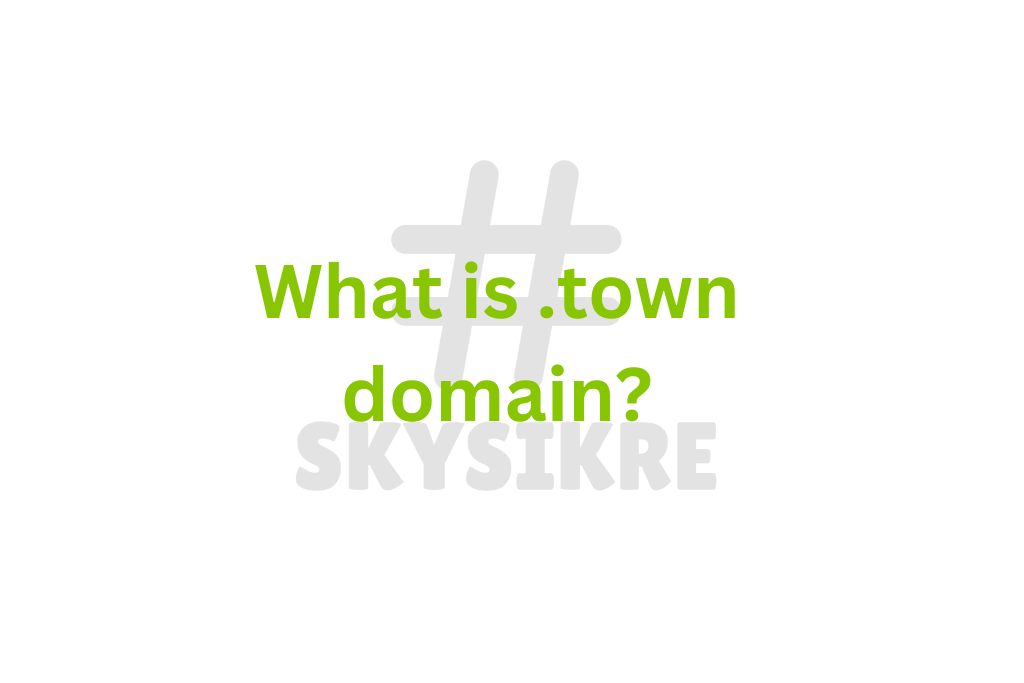Introduction to .town Domains
The .town domain is a relatively recent addition to the vast domain name system (DNS), designed to serve as a top-level domain (TLD) specifically catering to communities, municipalities, and organizations aiming to establish a digital presence that reflects their locality. As a TLD, the .town domain functions as one of the several suffixes that can be appended to any domain name, allowing entities ranging from small communities to larger urban institutions to create web addresses that emphasize their geographical identity.
In the digital landscape, the significance of .town domains cannot be overstated. They provide a platform that enables towns and cities to enhance their online visibility, foster community engagement, and promote local businesses or initiatives. By adopting a .town domain, organizations can convey a sense of local pride and identity, which can be particularly appealing to residents and visitors alike. This leads to a more intuitive online experience, as potential users can easily recognize the regional focus associated with the web address.
The operation of .town within the DNS adheres to the same principles as other TLDs. When a user types a .town domain into their web browser, the DNS system translates the domain into an IP address, directing them to the correct server hosting the website. This simplification of access is critical for fostering interaction between local entities and their online audience. Furthermore, the emergence of the .town TLD illustrates the ongoing evolution of the internet, where communities are increasingly looking to carve out unique spaces in the digital realm that resonate with their specific identities and values.
History and Evolution of .town Domains
The .town domain is one of the newer additions to the expansive range of generic top-level domains (gTLDs), launching as part of a significant expansion of the Internet’s domain name system in 2014. This decision was part of a broader initiative spearheaded by the Internet Corporation for Assigned Names and Numbers (ICANN) to encourage more intuitive and relevant domain name options. The primary purpose of the .town domain is to provide a specific digital identity for communities, municipalities, and local organizations looking to enhance their online presence.
The introduction of the .town domain was met with enthusiasm from local governments, community organizations, and businesses, all of whom sought to strengthen their identities on the internet. This domain name extension appealed particularly to cities and towns that desired a dedicated space online to foster local engagement and collaborate with residents. The goal was not only to provide city information but also to promote local events and businesses, thereby building a sense of community.
Since its inception, the .town domain has witnessed notable developments and an increasing recognition of local domains as vital tools for promoting local culture and connectivity. With the growing interest in community-focused platforms, many municipalities have adopted .town domains to support local tourism and economic development. This trend reflects a broader shift towards localized online branding, which helps communities differentiate themselves amidst the vast digital landscape.
Furthermore, as the internet continually evolves, gTLDs like .town have paved the way for enhanced digital identity options for various communities. As more organizations and residents discover the advantages of localized domains, the .town extension is likely to gain even greater traction, ensuring that the unique stories and offerings of towns are effectively represented online.
Benefits of Using a .town Domain
The utilization of a .town domain offers numerous advantages, particularly for businesses and organizations aiming to enhance their local presence. One of the primary benefits is its positive impact on local SEO. Search engines favor domain names that are relevant to geographic locations, and a .town domain serves as a clear indication that the associated entity is rooted in a specific community. This can lead to improved rankings in search results, making it easier for potential customers to discover local services and products.
Fostering community engagement is another critical advantage of a .town domain. By incorporating a local focus into their domain name, businesses and organizations can resonate more with residents. This can bolster community loyalty and create a sense of partnership between the business and local population. For instance, a small café using a .town domain can promote local events, collaborate with nearby artisans, and host activities that attract residents, thereby deepening its ties within the community.
Moreover, establishing a strong local identity is essential for any business aiming to differentiate itself in a competitive market. A .town domain not only conveys location but also evokes a sense of belonging. Companies that use this domain extension can effectively communicate their dedication to serving the local community. Real-world examples include small businesses and non-profits that have successfully harnessed a .town domain to promote their offerings and initiatives, driving both traffic and community interest. Town centers and local organizations adopting .town domains further illustrate how this extension can embody and elevate community spirit.
Ultimately, opting for a .town domain can significantly contribute to a business’s success by enhancing local visibility, promoting community involvement, and fostering a strong identity within a geographic area.
How to Register a .town Domain
Registering a .town domain can be an exciting step for individuals or businesses looking to establish an online presence that reflects their community or specific interests. The process requires careful consideration and following a series of steps to ensure that the registration is completed successfully.
The first step in registering a .town domain is to choose an accredited domain registrar. There are numerous registrars available, each offering different services and pricing structures. It is advisable to compare factors such as customer support, user interface, and additional features like web hosting or email services. Popular registrars include GoDaddy, Namecheap, and BlueHost, among others.
Once a registrar has been selected, the next step is to search for your desired .town domain name. This is typically done through the registrar’s website, where a search feature allows you to check the availability of your chosen name. If the domain is already taken, it may be necessary to brainstorm alternatives or consider variations that still convey your intended message.
The registration process involves filling out an online form with necessary documentation, which may include your personal information or business details. Be prepared to provide accurate data as it will be used for the WHOIS database, which records the ownership of the domain. Ensure that your details are provided correctly to avoid any potential issues in the future.
Regarding costs, the price of a .town domain can vary significantly depending on the registrar and any additional services you choose to add. Typically, registering a domain can range from $10 to $30 per year. Keep in mind that some registrars may offer discounts for the first year or for purchasing multiple years at once.
As you finalize your decision, selecting an effective domain name that reflects your intentions is crucial. A concise, memorable name that resonates with your target audience will not only enhance visibility but can also create a sense of community and belonging. After following these steps, you will have successfully registered your .town domain, positioning your online identity effectively.
Who Should Consider a .town Domain?
In the evolving landscape of digital marketing and online presence, selecting the appropriate domain extension is essential for businesses and organizations. The .town domain is specifically tailored for local entities, making it a compelling choice for various target audiences. Understanding who can benefit from this unique domain extension is crucial for optimal utilization.
Local businesses stand out as significant beneficiaries of the .town domain. For retailers, restaurants, and service providers, the .town extension not only reinforces their commitment to the community but also aids in improving local search engine optimization (SEO). By incorporating the .town domain, these businesses can create a sense of local identity, making it easier for customers to find them when searching for services or products unique to their area.
Community organizations are another group that can take advantage of a .town domain. Nonprofits, local clubs, and civic associations often strive to foster community connections and spread awareness about their initiatives. A .town domain can serve as a digital hub for these organizations, promoting events, sharing resources, and providing critical information to residents. This cohesive online presence can enhance engagement and encourage local participation.
Event planners also stand to gain from adopting a .town domain. Whether hosting festivals, fairs, or local gatherings, using this domain can help in developing a brand associated with a particular location. This connection not only aids in marketing efforts but also assists attendees in finding relevant details quickly and easily.
Municipalities and local governments may find the .town domain beneficial as well. By creating a dedicated .town website, they can facilitate communication with residents, promote local initiatives, and provide easy access to information. This strengthens community ties and enhances civic engagement, proving that a .town domain can be pivotal for various local stakeholders.
Challenges and Considerations with .town Domains
The .town domain extension serves as a distinctive identifier for geographical communities, and while its advantages are notable, there are several challenges and considerations that individuals and organizations should be aware of before opting for this TLD.
One prominent challenge when selecting a .town domain is the availability of desired domain names. As more individuals and businesses recognize the value of a .town domain for promoting local identities, the competition for suitable names is intensifying. Consequently, securing a relevant domain name that accurately reflects the community or service being offered may require creativity, as the more straightforward options might already be taken.
Additionally, competition with other established top-level domains (TLDs) presents another hurdle. Many websites are still using general TLDs, such as .com or .net, which can dilute the distinctiveness of the .town name. As a result, businesses may find it challenging to effectively communicate their geographical focus amidst a myriad of other available TLDs. This situation necessitates an effective marketing strategy that outlines the unique value proposition of using a .town domain to prospective visitors.
Another consideration is the requirement for robust marketing strategies to build an online presence. While having a unique .town domain can set a website apart, merely having the domain is insufficient for attracting traffic. Businesses and local entities must invest in search engine optimization (SEO), social media marketing, and community engagement to ensure that the .town extension is well recognized and effectively promotes their local identity. Ultimately, the perceived value of a .town domain will largely depend on how effectively it is marketed to potential audiences.
Comparing .town to Other Geographic Domains
The emergence of geographic domain extensions has provided various options for individuals and businesses to establish their online presence. Among these, the .town domain stands out as a unique choice that caters specifically to community-centric content. This section will compare the .town domain with other popular geographic domains such as .city, .place, and .local, highlighting their differences and similarities.
The .city domain is broadly utilized for urban-centric websites and organizations that aim to represent cities or municipalities. It serves as a platform for cities to promote their tourism, services, and local businesses. Although .city is primarily designed for urban environments, it may lack the intimate connotation that a .town domain conveys. The choice of .town can add a sense of community charm, making it more suitable for smaller, close-knit locations.
Moving on to the .place domain, it serves a slightly different purpose. While it can apply to various locations, this extension is often used for experiential marketing campaigns, events, and localized businesses. However, the term “place” can be perceived as generic, whereas the .town domain specifically targets a defined community, thereby establishing a more personal appeal. When businesses seek to create strong local ties, .town becomes the favorable option.
The .local domain is primarily geared towards businesses that serve a specific locality. Although effective in targeting local clientele, it does not necessarily embody community-centric themes. In contrast, a .town domain evokes a sense of belonging and identity linked to a particular community. This emotional connection can resonate well with residents and potential visitors alike. When determining the most appropriate domain, consider the community’s character and the type of engagement intended.
In summary, each geographic domain extension serves its purpose; however, the .town domain is particularly advantageous for fostering a sense of community. It is essential to evaluate the specific needs and objectives when choosing between .town and other geographic options for your online presence.
Future Trends for .town Domains
The digital landscape is constantly evolving, and the growth of the .town domain is a pivotal aspect of this transformation. As communities leverage the internet to foster local engagement, the demand for localized online presence is expected to surge. This trend aligns with the broader shift towards personalization in branding and marketing, where businesses and organizations seek to establish a local identity that resonates with their audience.
One of the key predictions for the future of .town domains is the increasing relevance of community-focused branding. As people become more inclined to support local businesses, the .town domain emerges as an effective tool for organizations aiming to distinguish themselves within their communities. By adopting a .town domain, businesses can instantly communicate their geographical and communal ties, fostering a sense of connection with local consumers.
Moreover, as municipalities and local governments prioritize digital transformation, the .town domain is likely to become more prevalent in government-related websites and initiatives. This trend will facilitate better communication with residents and support civic engagement, thereby enhancing the overall functionality of local governance in the digital realm.
Another aspect to consider is the rise of community-centric platforms that aim to connect residents for various purposes, from sharing local news to organizing events. These platforms, utilizing the .town domain, can become essential hubs for neighborhood interaction, enabling people to share experiences and resources more efficiently.
In summary, as the need for localized digital identities becomes more pronounced, .town domains will likely gain prominence. The future of these domains appears promising, with enhanced community branding, government utilization, and the emergence of platforms focused on local interaction paving the way for their growth. It will be essential for businesses, organizations, and communities to adapt and harness the benefits of this trend to remain relevant in an increasingly digital world.
Conclusion and Final Thoughts
In summary, the .town domain presents a unique opportunity for communities, organizations, and businesses to establish a digital presence that resonates with their local identity. As we have explored throughout this article, a .town domain is not just an extension; it encapsulates the spirit of community, making it an ideal choice for entities looking to engage with their audience on a more localized level. By adopting a .town domain, businesses can effectively communicate their commitment to serving their locality while fostering a stronger sense of belonging among their audience.
The significance of community identity in the digital realm cannot be overstated. With a .town domain, websites can clearly signal their geographical focus and community-oriented ethos, distinct from more generic domains. The use of a .town extension allows for enhanced visibility in local searches, making it easier for residents and visitors alike to find relevant information about events, services, and initiatives in their area.
Moreover, as more individuals and organizations seek to capitalize on digital marketing efforts, utilizing a .town domain can give a significant competitive advantage. This specialization not only enhances brand recognition but also fosters trust and loyalty among local users. As communities continue to evolve in the digital age, adopting a .town domain may very well be a step in the right direction for anyone wishing to fortify their local presence.
In conclusion, whether you are a small business, a local government, or a community organization, considering what is a .town domain could be pivotal for your digital strategy. Leveraging the unique characteristics of this domain can undoubtedly lead to positive engagement and growth for community-focused projects. Embrace the opportunity to connect and represent your community in a meaningful way online.






